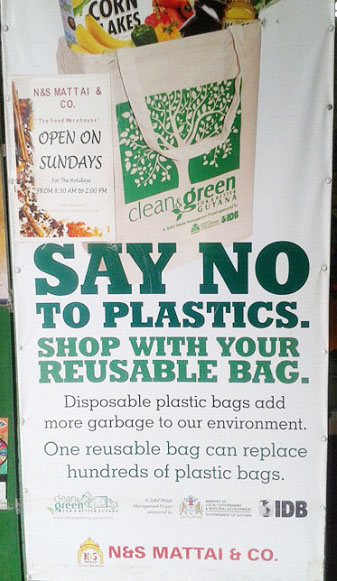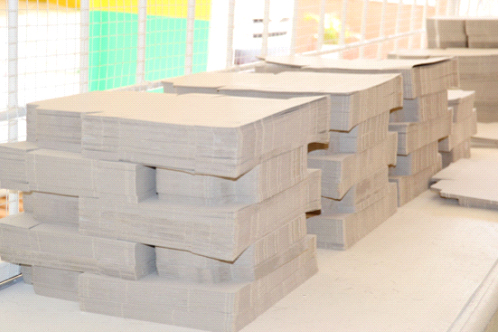Harry Mattai, the proprietor of N & S Mattai and Company of 4 Water Street, South Cummingsburg remembers Guyana’s 2005 Great Flood and its disastrous consequences for the coastal region.
He recalls the immovable mountains of garbage that impeded the flow of water and created lethal lakes and rivers that poisoned the land and left destruction and disease in its wake. The unbearable permanence of discarded Styrofoam containers remain most etched in his memory.
Change, however, does not always come easily. Styrofoam containers are cheap and – for the purposes
to which they are commonly put – efficient. A
year ago N&S Mattai began to offer biodegradable
containers in preference to Styrofoam ones. The company has lost millions.
For Harry Mattai it’s about “conscience” and about the timely lobbies of a daughter who is an environmentalist. She used to work for the Environmental Protection Agency (EPA) and now she works for REPSOL. He wants a prohibition on the use of the popular black plastic bags too; or at least the attachment of a consumer price to it. The company uses its own biodegradable bags. Over a two-year period more than 19,000 Mattai-branded reusable shopping bags have been circulated. People rarely return with them.
He strongly supports the decision to outlaw the use of Styrofoam containers from the start of next year. He believes, however, that that is merely the tip of the iceberg. “Probably about twenty per cent of the problem,” he says.
He wants a greater level of environmental consciousness, not just among consumers but amongst businesses as well. They have to encourage the re-using of biodegradable bags.
Previously the company imported between eight and ten 40-foot containers of Styrofoam food containers from China. After the company stopped offering the Styrofoam products the loss of patronage went beyond the containers. Some of the customers who remained in the market for Styrofoam food containers simply stopped shopping at Mattai altogether. His commitment allowed him to endure the financial loss. The Pegasus, Grand Coastal Inn and Cara Suites have remained loyal.
The company currently offers two types of biodegradable food containers; one made of sugar cane husk and which degrades within 30 days. The other container is made of corn starch.
There are cost considerations here. Biodegradable containers cost about $40 more than Styrofoam containers because of the duties and VAT on the more environmentally friendly product. He wants the ban on the Styrofoam containers to coincide with a reduction of duties and taxes on the biodegradable containers. For good measure Mattai also has the equivalent of a 20-foot container of cardboard food boxes in stock. They are being retailed at $30 each. They have been “moving slowly.”
Jermin’s Enterprise Inc (situated at 28 Ketley Street, Charlestown) like N&S Mattai is also hoping that the new year and the hoped-for disappearance of the Styrofoam containers will bring a significant increase in the sales of biodegradable containers. Jermin Culley, the company’s Guyanese-born, US-based owner, started importing biodegradable containers in 2012.
Tonya Lee, the company’s Marketing Manager says that it has made some inroads into the market. Over time it has cultivated about 50 customers in Berbice, Georgetown, East and West Coast Demerara and Bartica. Since the announcement of the January 1 ban on Styrofoam the company has received more enquiries. Again, there is the issue of price, which is higher than Styrofoam because of “duties and VAT.” The products are imported from the Caribbean and North America.
Over the past four years the company has persistently sought to make a case to the Guyana Revenue Authority. Recently, the GRA has responded that government is prepared to look into the request.
Jermin’s imports and sells a range of biodegradable containers and, like Mattai, hopes that the long-awaited ban on polystyrene containers will increase the size of their own respective markets for biodegradable receptacles. The nation, of course, is hoping for much more from the decision by the government that Guyana will finally part company with the environmentally unfriendly receptacles.








